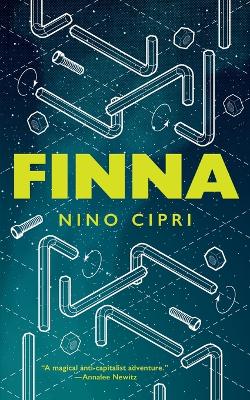Reviewed by nannah on
- misgendering
Representation:
- the protagonist is sapphic and has anxiety
- the love interest is black, non-binary, and sapphic
An elderly customer at an IKEA-like store goes missing through a multidimensional portal, and it's up to two employees, who recently became exes, to track her down. To do it, they'll have to avoid man-eating furniture, swarms of clones, and — if possible — repair their friendship if they stand a chance of succeeding.
In the acknowledgments, Nino Cipri says that they initially wrote this as a screenplay, which tells me a lot about the stylistic choices that I perhaps found too dramatic. I can actually see it doing very well as a movie — in a way that I didn't enjoy it as much in this format.
As it is, I think the biggest problem I have with this novella is that it feels miscategorized. It almost seems more fitting for the young adult category rather than the adult. That's not to say the writing is "bad" or that the story is immature, but that the characters and especially the dialogue can be very dramatic, which lends itself better to YA fiction. The book is filled with fandom jokes, quippy one-liners, and adults who read more like teenagers. There was one part, too, where the internal monologue seemed directly ripped from a tumblr post — I remember reading it a few years ago.
But it's not what I would expect from adult science fiction, and it's definitely not what I would hope from a Hugo award winner. I was hoping for a scathing critique of capitalism, but what I read was "'Capitalism,' Jules says philosophically. "'Yep.'" It reads more like pseudo-activists trying to say all the right buzzwords rather than two characters having a meaningful exchange.
In terms of plot, this book moves very quickly, and it keeps your attention the entire time. There are a couple spots where I had to suspend my disbelief quite a bit (like the main character Ava having to carry an unconscious woman on her back while sprinting), but it's an easy and fast read.
The other big problem I had with the story, though — and something I hoped Cipri wouldn't do — was make the woman who initially lost her grandma, Uzmala, either a) not recognize Uzmala, even with the new accent she must have (because how can she not? English isn't even her first language) or b) the granddaughter is absolutely okay with this woman who isn't her grandma but who apparently just shares her genetic material. Is that all that makes a person? Uzmala is going to tell her the truth "eventually". If I was the granddaughter I would be livid. I hate that story choice.
However, despite all this, the last chapter in particular was great and contains the best writing in the book. I also adore Uzmala. She is hands down the best character in this entire thing, and I have no complaints about her whatsoever. I'm considering reading on just because of her, even though the second book might not even have her in it. I want to see what other kinds of characters Nino Cipri can create.
Reading updates
- Started reading
- 16 December, 2022: Finished reading
- 16 December, 2022: Reviewed
